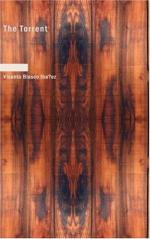The whole District worshipped as a sacred flagstaff that bronzed, muscular, massive figure, which floated a huge, flowing, gray-flecked mustache from its upper end.
“Don Ramon, you ought to remove that bush,” his clerical friends would say to him with a smile of affectionate banter. “Why, man, you look just like Victor Emmanuel himself, the Pope’s jailer.”
But though don Ramon was a fervent Catholic (who never went to mass), and hated all the infidel turnkeys of the Holy Father, he would grin and give a satisfied twirl at the offending mouth-piece, quite flattered at bottom to be likened to a king.
The patio of the Brull mansion was the throne of his sovereignty. His partisans would find him there, pacing up and down among the green boxes of plantain trees, his hands clasped behind his broad, strong, but now somewhat stooping back—a majestic back withal, capable of supporting hosts and hosts of friends.
There he “administered justice,” decided the fate of families, settled the affairs of towns—all in a few off-hand but short and decisive words, like one of those ancient Moorish kings who, in that selfsame territory, centuries before, legislated for their subjects under the open sky. On market-days the patio would be thronged. Carts would stop in long lines on either side of the door. All the hitching-posts along the streets would have horses tied to them, and inside, the house would be buzzing like a bee-hive with the chatter of that rustic gentry.
Don Ramon would give them all a hearing, frowning gravely meanwhile, his chin on his bosom and one hand on the head of the little Rafael at his side—a pose copied from a chromo of the Kaiser petting the Crown Prince.
On afternoons when the Ayuntamiento was in session, the chief could never leave his patio. Of course not a chair in the city hall could be dusted without his permission; but he preferred to remain invisible, like a god, knowing well that his power would seem more terrible if it spoke only from the pillar of fire or from the whirlwind.
All day long city councilors would go trotting back and forth from the City Hall to the Brull patio. The few enemies don Ramon had in the Council—meddlers, dona Bernarda called them—idiots who swallowed everything in print provided it were against the King and religion—attacked the cacique persistently, censuring everything he did. Don Ramon’s henchmen would tremble with impotent rage. “That charge must be answered! Let’s see now: somebody go and ask the boss!”




